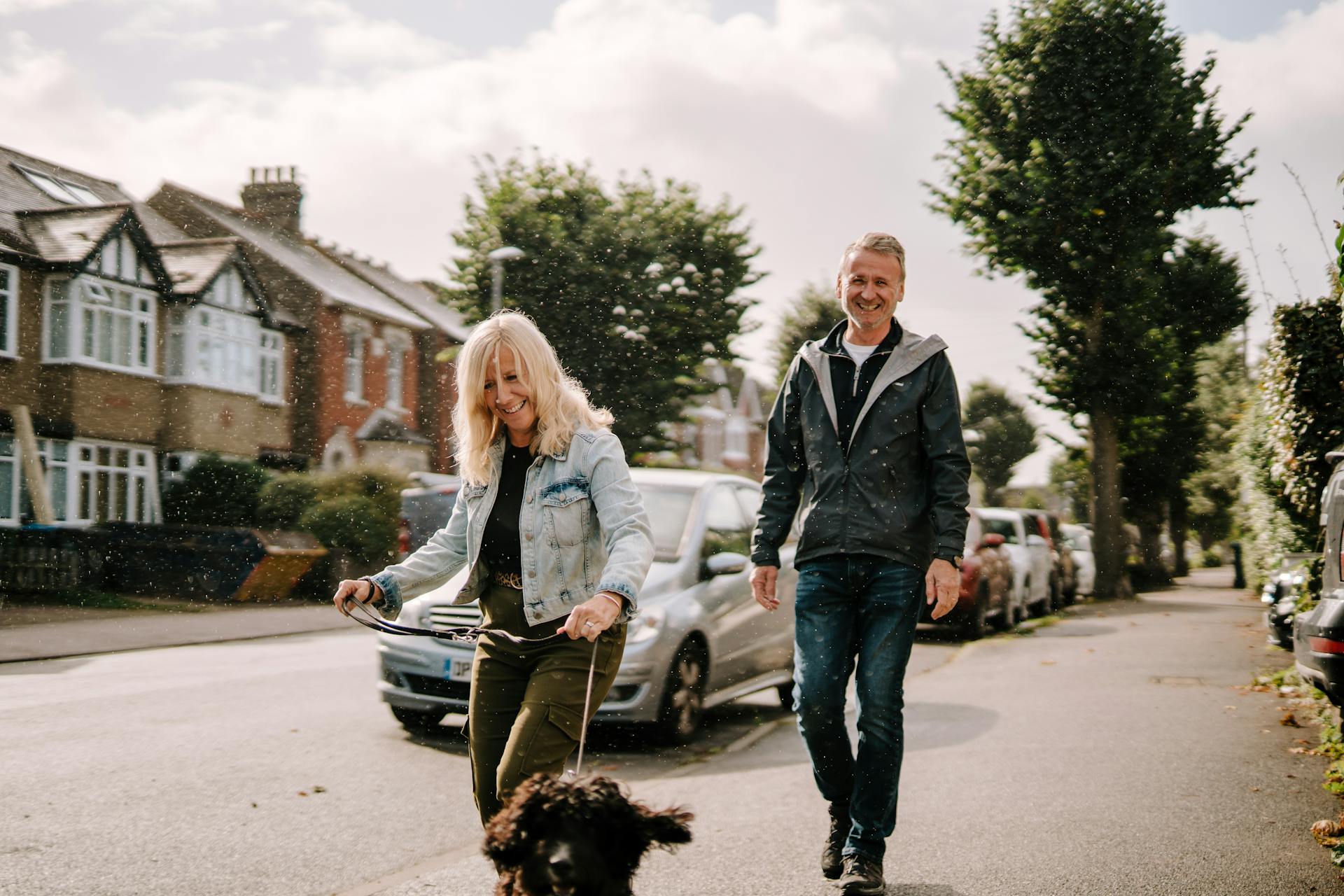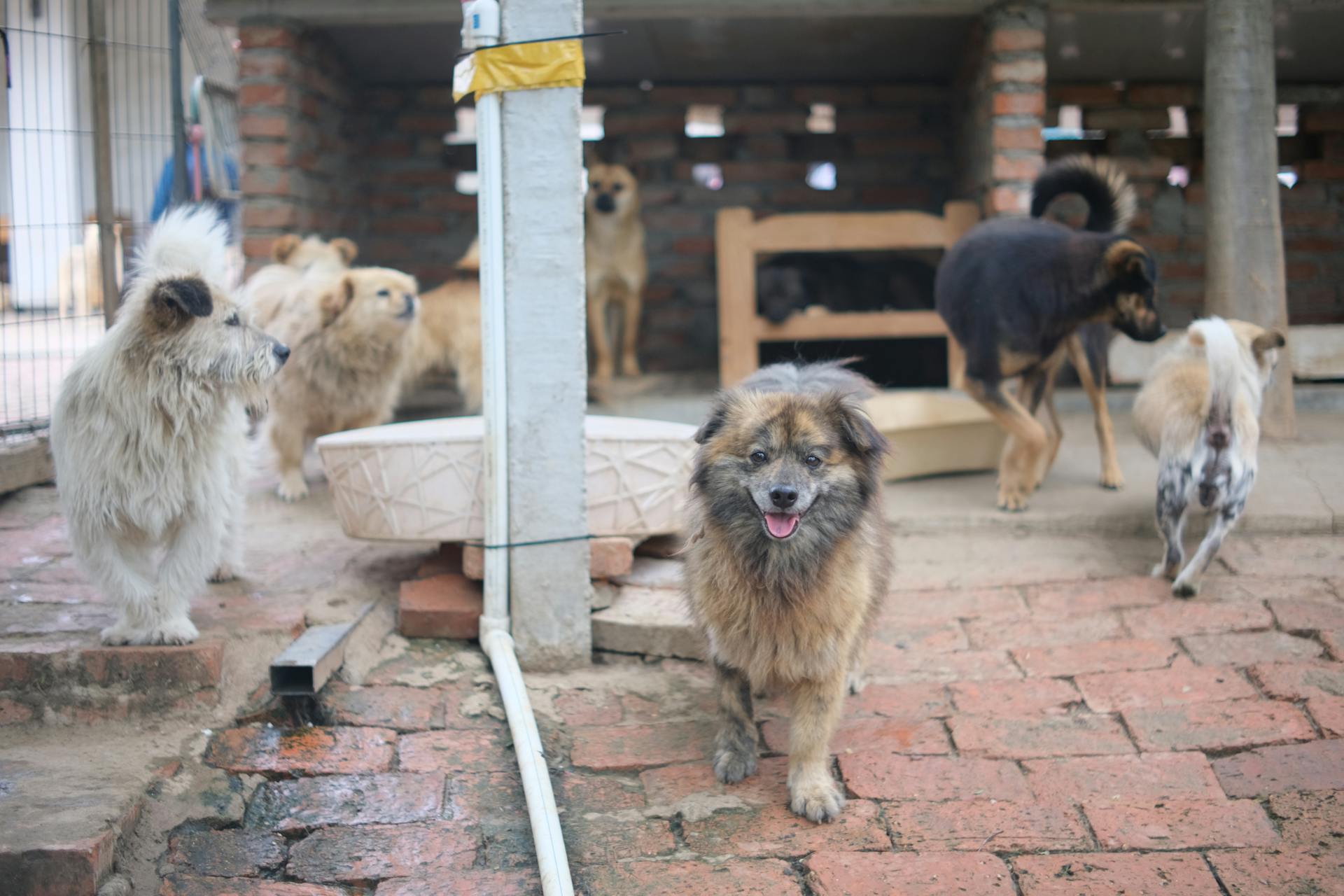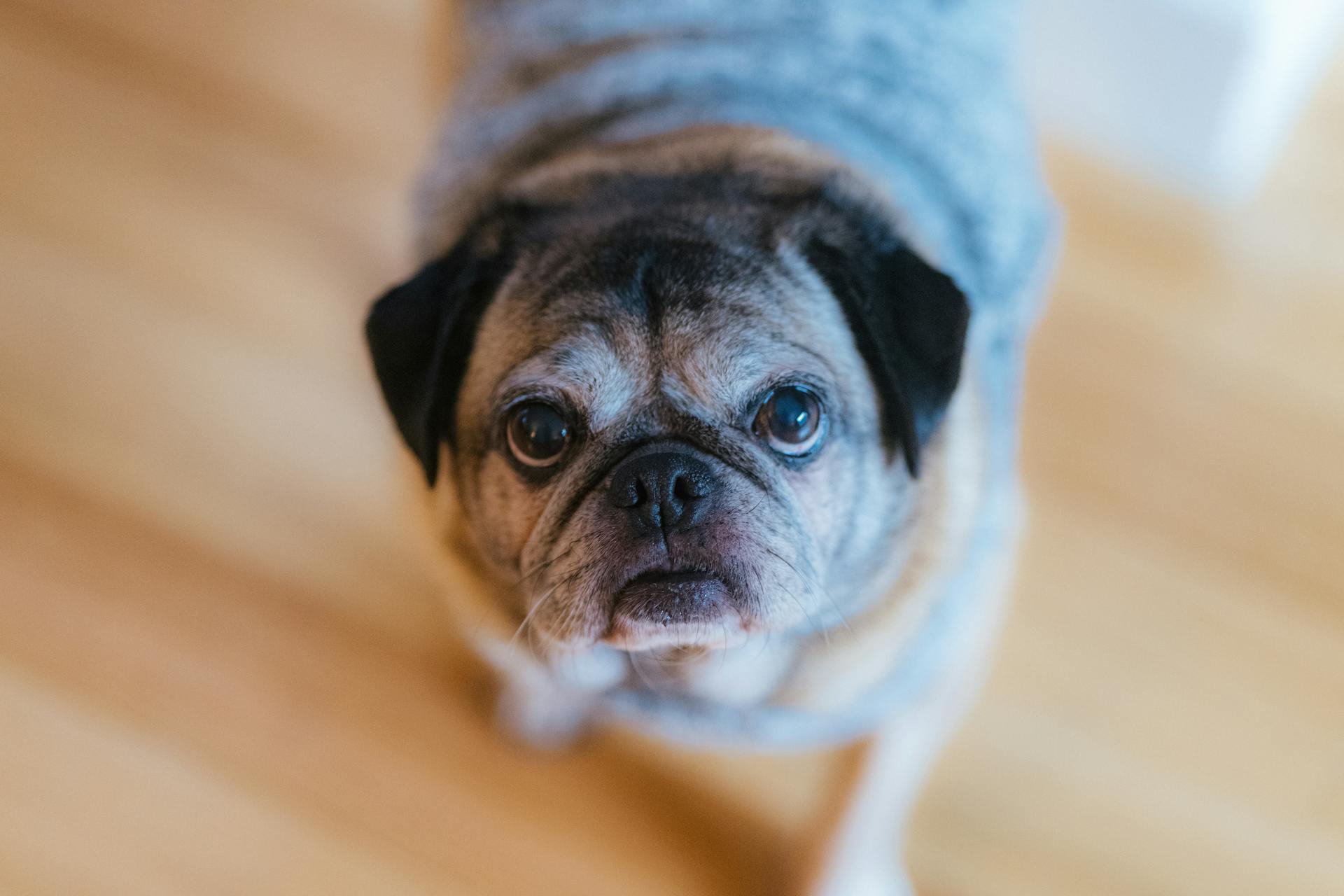
Preventing dog dementia requires a multi-faceted approach that incorporates diet, exercise, and mental stimulation.
A well-balanced diet rich in omega-3 fatty acids can help support brain health.
Exercise is essential for overall health, including cognitive function, and dogs need at least 30 minutes of physical activity per day.
Causes of Dog Dementia
As dogs age, their brains undergo changes that can lead to cognitive decline. The exact causes of dog dementia are still being studied, but researchers have found that the brain atrophies, meaning cells die, especially in the cerebral cortex and cerebellum.
This can be due to the buildup of abnormal proteins, such as beta amyloid, which disrupts nerve signaling in the brain. High levels of monoamine oxidase B (MAOB) can also degrade neurotransmitters, making it harder for the brain to send signals.
Dogs with epilepsy and those who lead a sedentary lifestyle are at a higher risk for developing dog dementia. It's essential to provide regular exercise and mental stimulation to help prevent this condition.
Types of Canine Cognitive Decline
There are several different types of canine dementia, and the condition shows itself in different ways depending on the dog and the type of CCD.
Canine cognitive decline can manifest in various forms, and it's essential to understand the different types to provide the best care for your furry friend.
The symptoms of CCD can indicate a number of other conditions and illnesses, from vestibular disease to degenerative myelopathy, making it a process of elimination to diagnose.
While there is no specific dog dementia assessment, veterinarians will run a number of tests to rule out other illnesses, including a physical examination and routine blood tests.
Your veterinarian will rule out all other potential medical issues before diagnosing your dog with CCD, making early detection crucial.
For more insights, see: What Dog Food Is Making Dogs Sick
Causes of Aging
As dogs age, their brains undergo significant changes that can lead to cognitive decline. Brain atrophy, or the death of brain cells, is a common occurrence in older dogs. This affects the parts of the brain responsible for learning and memory, as well as coordination.
Dogs with Canine Cognitive Dysfunction (CCD) have an abnormal protein building up in their brains, called beta amyloid. This protein buildup disrupts nerve signaling and contributes to cognitive decline.
Research has also shown that dogs with epilepsy and those who lead a sedentary lifestyle are at a higher risk of developing CCD.
Here are some possible causes of aging in dogs:
- Brain atrophy, especially in the cerebral cortex and cerebellum.
- Abnormal protein buildup, such as beta amyloid.
- Decreased nerve signaling due to protein buildup.
- Dopamine depletion, which may lead to cognitive decline.
- Plaque or protein accumulation that disrupts nerve impulses.
Symptoms of Dog Dementia
Dogs with dementia can exhibit a range of symptoms, from confusion and disorientation to changes in behavior. These symptoms can be subtle at first, but tend to become more obvious over time.
Progressive symptoms mean they get worse over time, and can be triggered by stressful events. It's essential to rule out other health issues, such as blindness, deafness, or urinary tract infections, before a diagnosis of dementia.
Confusion and disorientation can manifest in various ways, like walking up to the wrong side of a familiar door or staring off into space. Your dog may also forget where its food bowls are or go the wrong way on daily walks.
Visible symptoms of cognitive dysfunction can include peeing or pooing in the house, low energy or depression, and not sleeping at night. Forgetting commands, pacing, and staring into space are also common symptoms.
Other signs of dog dementia include barking more, eating less or much more, new fears or phobias, and aggression or changes in behavior. These symptoms can be wide-ranging and often start subtle, but worsen over time.
Here are some common symptoms of dog dementia:
- Confusion
- Peeing or pooing in the house
- Low energy or depression
- Not sleeping at night
- Forgetting commands
- Pacing
- Staring into space
- Barking more
- Eating less or much more
- New fears or phobias
- Aggression/changes in behaviour
Diagnosis and Treatment
Diagnosing dog dementia requires a veterinary examination and a thorough medical history.
A veterinarian will assess your dog's behavior, cognitive function, and physical health to determine the presence of dementia.
Treatment for dog dementia involves a multi-faceted approach that includes medication, environmental management, and behavioral modification.
Medications like selegiline and propentofylline can help slow the disease's progress and improve brain function.
To manage your dog's behavior and environment, provide daytime activities and opportunities for play, as well as structured social interaction for physical and mental stimulation.
Exposure to sunlight will help regulate your dog's sleep-wake cycle, and pet-proofing the house will make it more predictable for them.
How Veterinarians Diagnose
To diagnose dementia in dogs, veterinarians need a thorough history of your dog's health, including the onset and nature of symptoms and any incidents that might have triggered unusual behaviors.
They'll start by performing a complete physical examination to evaluate your dog's overall health status and cognitive functions.
Routine blood tests and thyroid testing are used to rule out other diseases that may cause behavioral changes associated with canine cognitive dysfunction syndrome.
Your veterinarian may also recommend an ultrasound or X-ray to further evaluate your dog's condition.
In some cases, they may suggest advanced imaging like an MRI or CT scan to get a clearer picture of what's going on.
Is Treated?
Dogs with dementia can be treated with a combination of management of behavior and environment, an enhanced diet, and medication.
Providing daytime activities and opportunities for play can effectively manage behavior. Structured social interaction is also essential for physical and mental stimulation.

Exposure to sunlight helps regulate the sleep-wake cycle, which is crucial for dogs with dementia. If your dog can't walk anymore, consider using a wagon or a stroller.
Managing the environment is vital by making it more predictable. Pet-proofing the house is essential, just like toddler-proofing it.
Adequate toileting opportunities are necessary for old dogs, as they can't "hold it" as they did when they were younger. Diapers, pads, and waterproof bed and furniture covers can be helpful in this situation.
Prevention and Care
Developing a daily routine for feeding, exercise, and other activities can help manage your dog's level of anxiety and promote nighttime sleep. Consistency is key, so stick to the same routine every day.
Ensuring your dog gets plenty of exercise, ideally out in the sun, and drinks enough water is crucial for maintaining physical and mental health. This can also help prevent anxiety and promote a good night's sleep.
Soothing music and aromatherapy may also help some dogs feel more comfortable. However, it's essential to spend quality time with your dog and strengthen the human-canine bond through activities and interaction.
Can Be Prevented?

Keeping your dog physically and mentally active can serve as a preventive measure for dog dementia.
While veterinarians aren't certain what causes CCD in dogs, maintaining a healthy lifestyle for your furry friend can help prevent it.
Engaging your dog in regular exercise, such as walks and playtime, can keep them physically active and mentally stimulated.
Providing your dog with a balanced diet and plenty of opportunities for socialization can also contribute to their overall well-being and potentially prevent dog dementia.
Supportive Care
Supportive Care is crucial for senior dogs experiencing cognitive dysfunction. Developing a daily routine for feeding, exercise, and other activities can help manage anxiety and promote a good quality of life.
Consistency is key, so make sure to keep your dog's routine as predictable as possible. This means feeding, exercising, and engaging in activities at the same times every day.
Exercise is essential for senior dogs, and it's best to get them outside in the sun. Regular physical activity can help reduce anxiety and promote relaxation.
Suggestion: Acana Dog Food for Senior Dogs

Drinking enough water is also vital for your dog's overall health and well-being. Encourage your dog to drink plenty of water throughout the day.
Soothing music and aromatherapy may also be beneficial for some dogs. These gentle stimuli can help calm your dog and make them feel more comfortable.
Spend quality time with your dog and strengthen your bond. This can be as simple as going for a walk or playing a game together.
Avoid leaving your dog home alone for extended periods of time, as this can exacerbate anxiety and stress.
For another approach, see: Dog Dementia Drinking Water
Lifestyle Changes
Stick to a routine, as regular patterns to their days can be comforting for your dog and help you detect any changes in their behavior. Try to feed and walk them at the same time each day, and encourage them to stay awake during the day if they seem restless at night.
Encourage your dog to keep active with gentle, regular exercise and activities, such as short walks in their favorite places. Keep them on the lead, under close supervision, or in an enclosed field/garden to ensure their safety. Make sure they have time to sniff and investigate, as this will help keep their brain active.
Establish a Routine
Establishing a routine can be a lifesaver for senior dogs with cognitive dysfunction. It's comforting for them and helps you avoid overfeeding or overexercising.
Regular patterns to their days can be incredibly beneficial. Try to feed and walk them at the same time each day.
A consistent routine can help your dog feel more secure and reduce confusion. This is especially important for dogs with sundowners syndrome, who may become restless or irritable after dark.
By sticking to a routine, you can better understand your dog's needs and avoid making mistakes. For example, if you notice your dog is getting restless at night, it may be because they've forgotten it's time for a walk or meal.
Encourage your dog to stay awake during the day if they seem to be restless at night. This can help regulate their circadian rhythm and improve sleep patterns.
A different take: How to Calm a Dog with Dementia at Night
Try Gentle Exercise
Try gentle exercise with your dog to keep them active and engaged. Regular walks in their favourite places can be a great way to start.

Short walks are best, especially for dogs that need close supervision or are in enclosed areas. This will help prevent overexertion and keep them safe.
You should also make time for your dog to sniff and investigate their surroundings, as this will help keep their brain active. This is especially important for dogs that might get bored or restless if they don't get enough mental stimulation.
Playing simple games at home can also be a fun way to keep your dog active and engaged.
Diet and Supplements
Feeding your dog a high-quality diet void of fillers can make a big difference in preventing dog dementia. This means choosing a food that's rich in nutrients and made with wholesome ingredients.
Omega-3 fatty acids are a great addition to your dog's diet, as they help promote brain health. You can find these in fish oil supplements or add them to their regular meals.
Certain supplements can also help promote brain health, including SAMe, medium-chain triglycerides (MCT), and antioxidants. These can be added to your dog's diet to help reduce the severity of dementia symptoms.
For your interest: Dog Dementia Supplement
Denamarin, silybin, and vitamin E are other supplements that have been shown to improve cognitive function in dogs. As with any supplement, be sure to talk to your vet before adding them to your dog's diet.
A healthy exercise routine is also essential for preventing dog dementia. Your vet can help you determine a schedule that's right for your dog based on their age and nutritional needs.
Here are some supplements that may help improve brain function in dogs:
Pheromones, such as a DAP collar, can also help reduce anxiety in dogs with cognitive dysfunction.
Frequently Asked Questions
How long does a dog live with dementia?
A dog's life expectancy with Canine Cognitive Dysfunction (CCD) varies, but with early treatment, they can live a normal life span, while severe cases often lead to euthanasia within 2 years. Early detection and treatment are crucial for a better outcome.
Are dogs scared when they have dementia?
Dogs with dementia may feel more scared and anxious due to confusion and overwhelm. This can be triggered by new environments, smells, and physical activity, such as walks.
Sources
- https://www.petmd.com/dog/conditions/neurological/dog-dementia
- https://www.thewildest.com/dog-health/canine-dementia-signs-symptoms-treatments
- https://www.thesprucepets.com/dementia-in-dogs-1117412
- https://www.pdsa.org.uk/pet-help-and-advice/pet-health-hub/conditions/dementia-in-dogs-cognitive-dysfunction
- https://www.webmd.com/pets/dogs/dog-dementia
Featured Images: pexels.com

